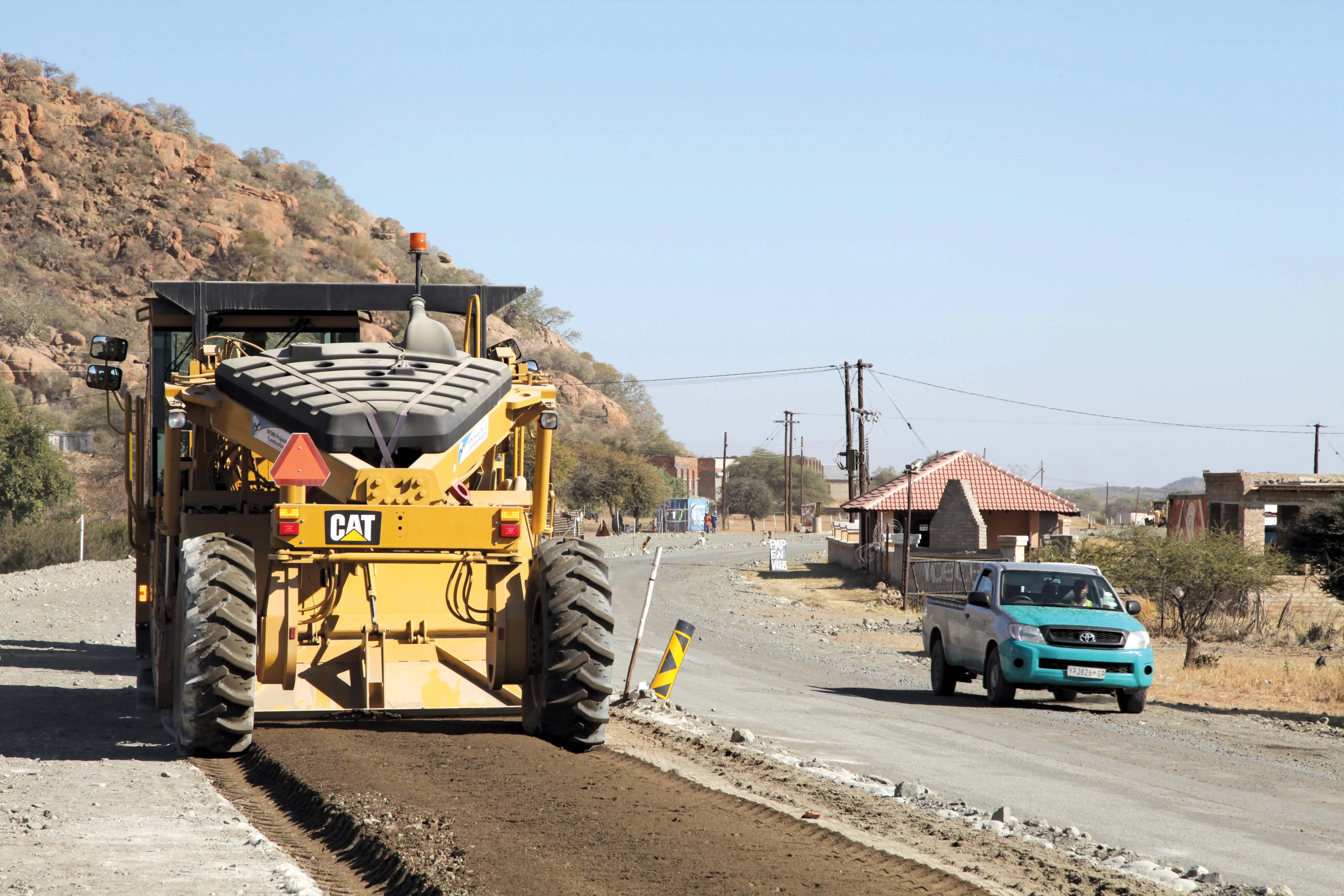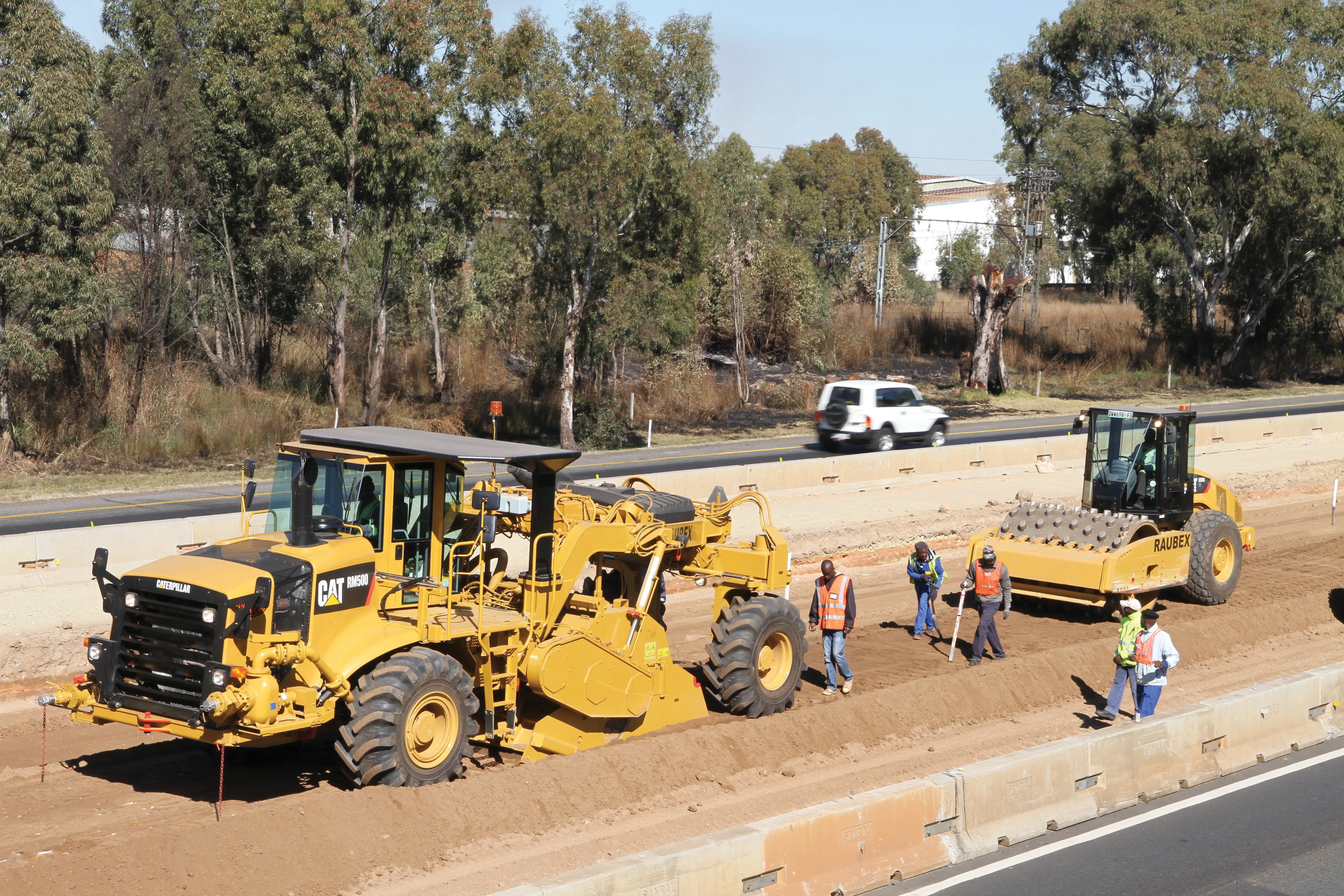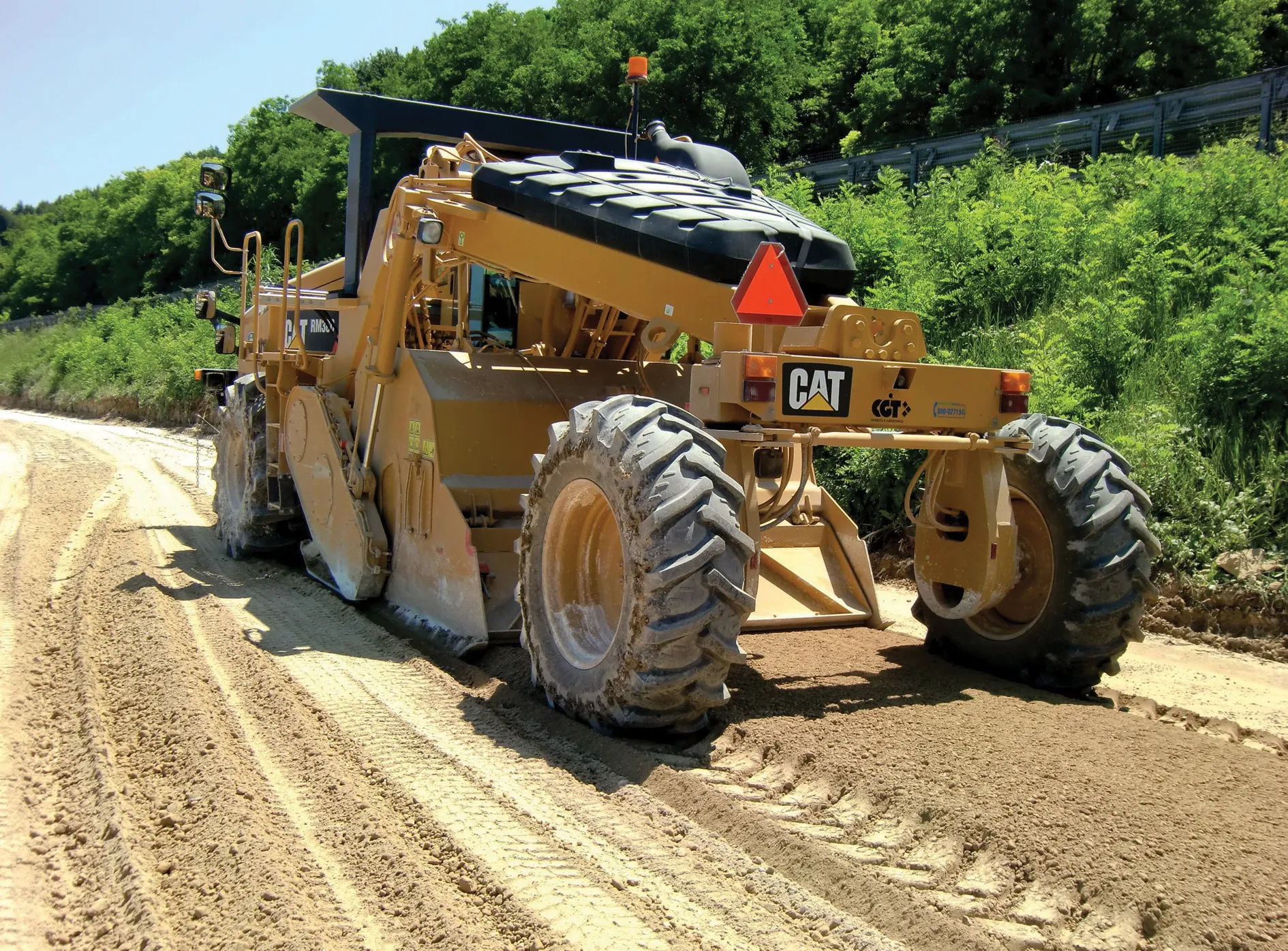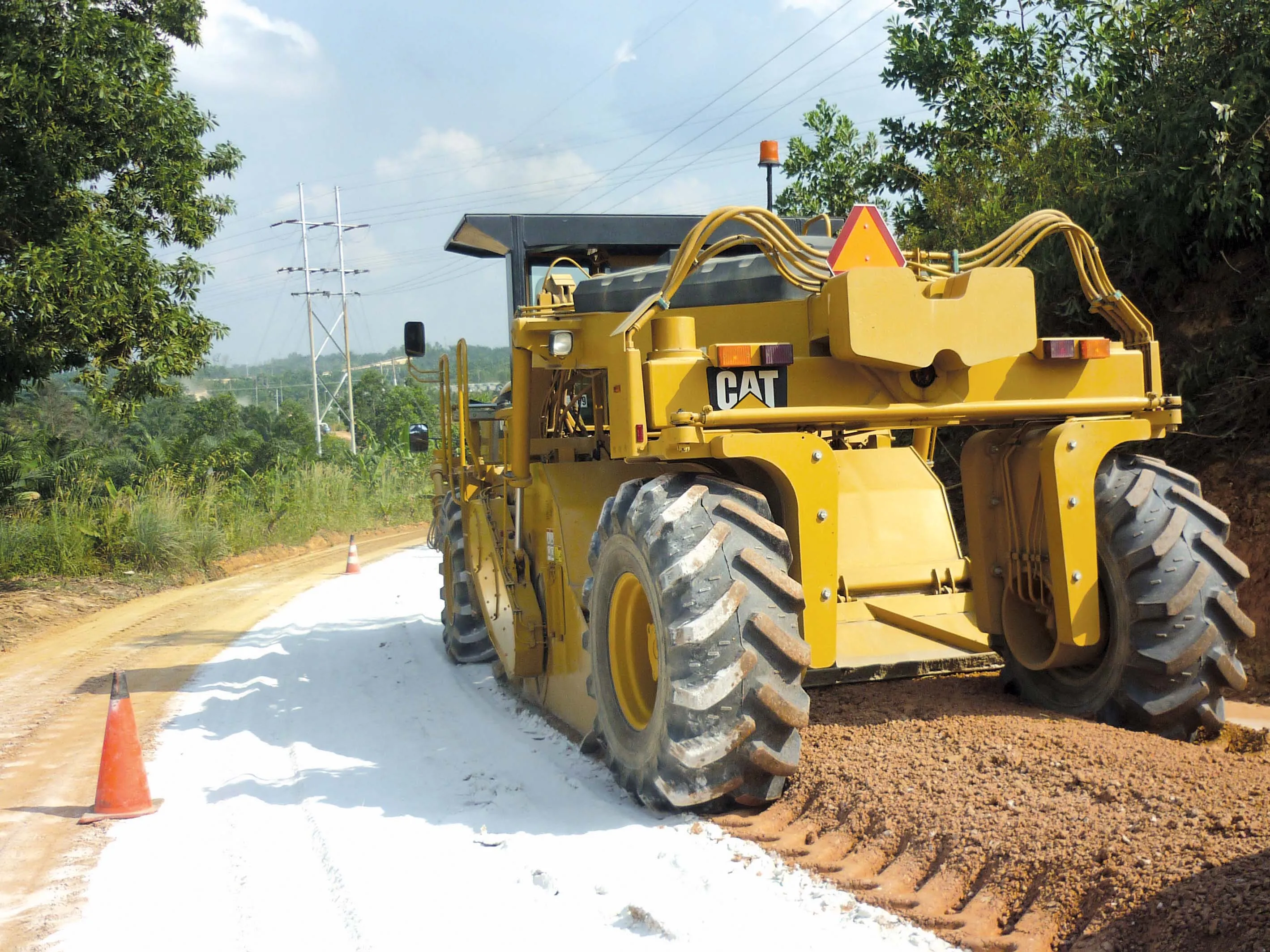Contractor Nyoni Projects is taking a new approach to two major road upgrades in the North West Province of South Africa.
The company is refining its fleet and processes with the use of two new Caterpillarr RM300 reclaimer/recyclers. By introducing these new machines and the associated working methods, the firm believes it can help meet the country’s growing road repair, reclamation and building needs.
The firm has seen an increase in productivity since it started using the machines. Maclaud Nyoni, m
October 3, 2014
Read time: 4 mins

Contractor Nyoni Projects is taking a new approach to two major road upgrades in the North West Province of South Africa
The company is refining its fleet and processes with the use of two new178 Caterpillar RM300 reclaimer/recyclers. By introducing these new machines and the associated working methods, the firm believes it can help meet the country’s growing road repair, reclamation and building needs.
The firm has seen an increase in productivity since it started using the machines. Maclaud Nyoni, managing director of Nyoni Projects said, “We can do a 300mm thick layer in one operation, yet with graders we could only do a 150mm layer at a time. The production levels from the RM300 more than trebled what one could achieve with a grader team, yet manpower resources remained the same, and other support (water trucks) only doubled.”
The North West roads work is the largest ever for Nyoni Projects. The first North West section involves the rehabilitation and reconstruction of a section of National Route 4 (N4) over a distance of some 25km from near Zeerust to Enzelberg.
The company used the RM300s to reclaim the existing 300mm sub-base, and it then added a 150mm G1 base course layer and sealed the road. Maclaud said, “An extension of time was granted due to bad materials encountered, which could not be recycled in-situ. Suitable material had to be sourced from borrow pits and was placed on top of the in-situ and stabilised using the RM300.”
Another key road reconstruction project covered a distance of almost 33km. It has involved reconstruction of the R565 starting just past the R556 Sun City turnoff and heading north, with a project duration of 22 months and an expected completion in late 2014. In addition to in-situ sub-base reclaimation, the road is being raised further by two layers. Culvert upgrades to improve drainage are also included.
In the past, Nyoni relied on its Cat grader fleet for the sub-base stabilisation phases, a process that is machine and labour intensive since each grader requires a dedicated team. Now a single Cat RM300 on each North West road section is being deployed to perform the in-situ recyling phase.
The all-wheel drive configuration allows the RM300 to work well in both full-depth reclamation and soil stabilisation applications. The machine is said to offer accurate cement stabilisation, as well as predetermination of the specified moisture content required, due to its computerised settings for the onboard, water-spray pump system. Keeping pace with the scope of works, Nyoni is comfortably stabilising between 800 - 1000m³/day.
On the Cat RM300, the rotor width is 2.438mm, with a maximum cutting/mixing depth of 508mm. Nyoni’s RM300s are equipped with the universal rotor and 200-point-attack, carbide-tipped tools arranged in a chevron pattern for maximum breakout force. A direct-drive mechanical transmission drives the rotor and provides three rotor speeds for maximum performance in a variety of materials and cutting depths.
“With the RM300 you can mill the sub-base and the selected material as one continuous layer, which significantly speeds up the construction programme,” Maclaud explained. “On the 33km section, we expect to complete all works two months earlier than scheduled.”
Without the use of rotary mixing technology and relying purely on graders, layer works would need to be constructed in single layers, with a set waiting period to allow for curing of each cement stabilised and compacted section. This would extend project timeframes considerably. “We’re even using the RM300 for the mixing of the G1 layer,” said Maclaud. “The graders then cut the final level, followed by compaction to complete the process.”
Meanwhile, as Nyoni presses ahead in the North West, the company is also working in parallel on various Gauteng provincial road projects. Examples include a three-year contract for the Ekurhuleni Metropolitan Municipality for gravel-to-asphalt upgrades.
The company is refining its fleet and processes with the use of two new
The firm has seen an increase in productivity since it started using the machines. Maclaud Nyoni, managing director of Nyoni Projects said, “We can do a 300mm thick layer in one operation, yet with graders we could only do a 150mm layer at a time. The production levels from the RM300 more than trebled what one could achieve with a grader team, yet manpower resources remained the same, and other support (water trucks) only doubled.”
The North West roads work is the largest ever for Nyoni Projects. The first North West section involves the rehabilitation and reconstruction of a section of National Route 4 (N4) over a distance of some 25km from near Zeerust to Enzelberg.
The company used the RM300s to reclaim the existing 300mm sub-base, and it then added a 150mm G1 base course layer and sealed the road. Maclaud said, “An extension of time was granted due to bad materials encountered, which could not be recycled in-situ. Suitable material had to be sourced from borrow pits and was placed on top of the in-situ and stabilised using the RM300.”
Another key road reconstruction project covered a distance of almost 33km. It has involved reconstruction of the R565 starting just past the R556 Sun City turnoff and heading north, with a project duration of 22 months and an expected completion in late 2014. In addition to in-situ sub-base reclaimation, the road is being raised further by two layers. Culvert upgrades to improve drainage are also included.
In the past, Nyoni relied on its Cat grader fleet for the sub-base stabilisation phases, a process that is machine and labour intensive since each grader requires a dedicated team. Now a single Cat RM300 on each North West road section is being deployed to perform the in-situ recyling phase.
The all-wheel drive configuration allows the RM300 to work well in both full-depth reclamation and soil stabilisation applications. The machine is said to offer accurate cement stabilisation, as well as predetermination of the specified moisture content required, due to its computerised settings for the onboard, water-spray pump system. Keeping pace with the scope of works, Nyoni is comfortably stabilising between 800 - 1000m³/day.
On the Cat RM300, the rotor width is 2.438mm, with a maximum cutting/mixing depth of 508mm. Nyoni’s RM300s are equipped with the universal rotor and 200-point-attack, carbide-tipped tools arranged in a chevron pattern for maximum breakout force. A direct-drive mechanical transmission drives the rotor and provides three rotor speeds for maximum performance in a variety of materials and cutting depths.
“With the RM300 you can mill the sub-base and the selected material as one continuous layer, which significantly speeds up the construction programme,” Maclaud explained. “On the 33km section, we expect to complete all works two months earlier than scheduled.”
Without the use of rotary mixing technology and relying purely on graders, layer works would need to be constructed in single layers, with a set waiting period to allow for curing of each cement stabilised and compacted section. This would extend project timeframes considerably. “We’re even using the RM300 for the mixing of the G1 layer,” said Maclaud. “The graders then cut the final level, followed by compaction to complete the process.”
Meanwhile, as Nyoni presses ahead in the North West, the company is also working in parallel on various Gauteng provincial road projects. Examples include a three-year contract for the Ekurhuleni Metropolitan Municipality for gravel-to-asphalt upgrades.








